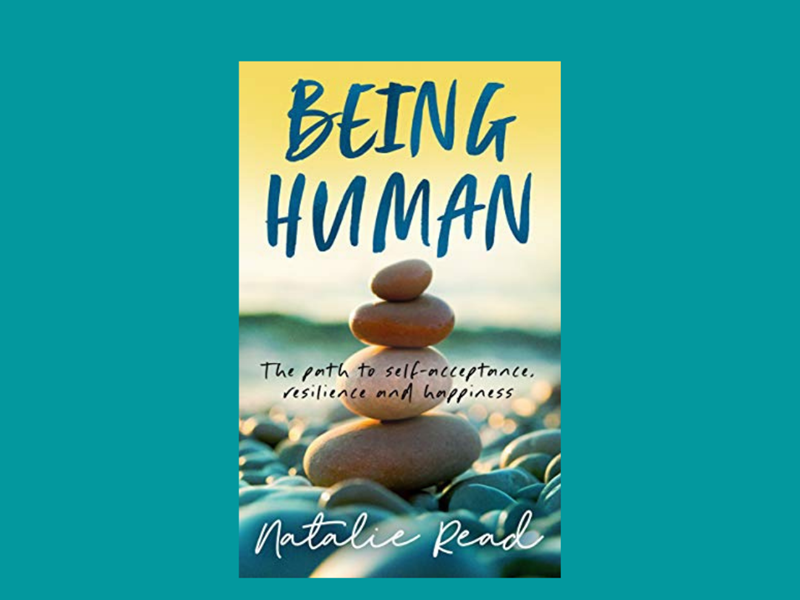Being human and the path to happiness By Natalie Read
- Hazel Butterfield
- 22 September 2021
A Guest Post: Natalie Read is a counsellor, working with university students and in private practice, with a background in the corporate world (25 years' experience in total), and the author of Being Human - the path of self-acceptance, resilience and happiness, now available online as paperback and e-book.
We all naturally want to do well, achieve success and feel good about ourselves. It’s an understandable desire but doesn’t always bring us the results we hope and sometimes has the potential to be unhealthy. Without realising, our expectations can be superhuman - happiness all of the time, success in every venture and being liked by the masses. Not meeting these expectations can lead to feelings of inadequacy, frustration, disappointment or a perception that we might be flawed compared to others.
It’s easy to understand how this myth is created - airbrushing, social media, Hollywood movies and a general collusion of portraying our best and “I’m fine” to others. As a counselor, I frequently hear why am I the only one feeling this way or why is everyone else happier/luckier than me? Expectations also play their part. A common theme currently is feeling confusion and frustration in response to overwhelm, anxiety and low mood instead of the expected elation and excitement alongside Covid restrictions easing.
As you inevitably fail in being superhuman, you’re likely to adopt strategies (subconsciously) that try to avoid difficulty or minimise unwanted feelings in future. These strategies might include: overworking, overthinking, over worrying, pleasing others, trying to be perfect, hiding behind a persona, ignoring emotion, avoiding opportunities where you could fail/be rejected, avoiding conflict and so on.
As it’s not possible to control life or avoid feelings indefinitely, these strategies are rarely effective and come with additional side-effects. Imagining you’d be better off being someone else or wishing that life was kinder to you, adds layers of judgement on top of what you’re already feeling. It’s a bit like digging yourself a steep hole to climb out of before you even start your day. As the pace of change and levels of uncertainty increase with Covid and other global events, the side-effects are arguably greater.
Working towards being human and accepting who you are, your humanness and the realities of life offers a healthier strategy with greater odds of success. Being human, we all have strengths and limitations, successes and failures, good and bad times and experience “positive” and “negative” emotions. There’s a difference between knowing and living this.
With self-acceptance, you’re more likely to practice self-care, have self-compassion, give yourself opportunities for success and radiate a confidence that’s magnetic to others. You’re more likely to have happier relationships with appropriate boundaries, be able to stick up for yourself, and feel more optimistic about the future. You learn to trust and accept what is rather than living up to expectations or pressures from others.
When things go wrong, you’re more likely to believe it’s one of those things, difficulties happen to everyone and that it’s an opportunity to learn, grow or change direction. You acknowledge everyone makes mistakes. You feel more resilient to be able to deal with difficulties and overcome them more easily. Any rejection or failure indicates it wasn’t right for you rather than there’s something wrong with you.
Steps you can take towards being more human:
Go with the flow - recognise difficulties happen to everyone, notice the impact of any judgements or attempts to control your feelings and challenging situations in making the “downs” deeper and longer. Work on responding rather than resisting what you’re facing.
Practice and act on self-reflection - check in with yourself frequently, acknowledge how you feel instead of what you expect to feel, find an outlet/act on information from your feelings, review and respond to your energy, stress and happiness levels.
Invest in self-care and self-compassion - evaluate yourself on your intentions/effort instead of the outcome, nurture a kinder inner voice, find healthier coping strategies, update your self-care regime regularly.
Change your story - notice the stories you tell yourself and their impact and how they can be self-fulfilling, challenge assumptions and work on building the stories that can bring you happiness, recognise and work on your defences and owning your “part” in relationships.
Be active in finding happiness - devote time to activities that bring you joy, spend more time with people you can be yourself with, focus on the present rather than postponing your happiness i.e. when lockdown restrictions are over, when I’m in a relationship etc.
Start by setting an intention to do something daily/weekly.
You can read more about increasing your happiness, self-confidence and resilience, improving relationships and preventing and managing mental health symptoms in Being Human - the path to self-acceptance, resilience and happiness, available now in paperback £9.99 or eBook £4.99.

